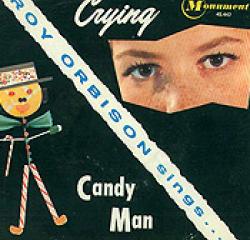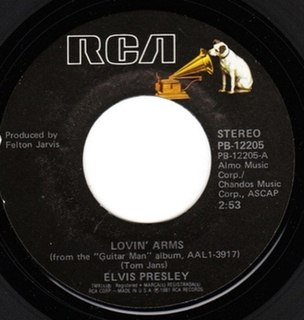Related Research Articles

"Unchained Melody" is a 1955 song with music by Alex North and lyrics by Hy Zaret. North wrote the music as a theme for the little-known prison film Unchained, hence the song title. Todd Duncan sang the vocals for the film soundtrack. It has since become a standard and one of the most recorded songs of the 20th century, most notably by the Righteous Brothers in July 1965. According to the song's publishing administrator, over 1,500 recordings of "Unchained Melody" have been made by more than 670 artists, in multiple languages.
"Without You" is a song written by Pete Ham and Tom Evans of British rock group Badfinger, and first released on their 1970 album No Dice. The power ballad has been recorded by over 180 artists, and versions released as singles by Harry Nilsson (1971), T. G. Sheppard (1983) and Mariah Carey (1994) became international best-sellers. Paul McCartney once described the ballad as "the killer song of all time".

"Me and Bobby McGee" is a song written by American singer-songwriter Kris Kristofferson and originally performed by Roger Miller. Fred Foster shares the writing credit, as Kristofferson intended. A posthumously released version by Janis Joplin topped the U.S. singles chart in 1971, making the song the second posthumously released No. 1 single in U.S. chart history after "(Sittin' On) The Dock of the Bay" by Otis Redding. Jerry Lee Lewis also released a version reaching number 1 on the country charts in 1971. Billboard ranked Joplin's version as the No. 11 song for 1971.

"Take Me Home, Country Roads", also known simply as "Take Me Home" or "Country Roads", is a song written by Bill Danoff, Taffy Nivert and John Denver about West Virginia. It was released as a single performed by Denver on April 12, 1971, peaking at number two on Billboard's US Hot 100 singles for the week ending August 28, 1971. The song was a success on its initial release and was certified Gold by the RIAA on August 18, 1971, and Platinum on April 10, 2017. The song became one of John Denver's most popular and beloved songs. It has continued to sell, with over 1.6 million digital copies sold in the United States.

"Crying" is a song written by Roy Orbison and Joe Melson for Orbison's third studio album of the same name (1962). Released in 1961, it was a number 2 hit in the US for Orbison and was covered in 1980 by Don McLean, whose version went to number 1 in the UK.

"I'm Every Woman" is the debut solo single by American singer Chaka Khan from her debut solo studio album Chaka (1978). It was Khan's first hit outside her recordings with the funk band Rufus. "I'm Every Woman" was produced by Arif Mardin and written by the successful songwriting team Nickolas Ashford and Valerie Simpson. The single established Chaka's career outside the group Rufus, whom she would leave after their eighth studio album Masterjam was released in late 1979.

"You Got It" is a song from Roy Orbison's twenty-second studio album, Mystery Girl (1989). The song was released posthumously in January 1989 with "The Only One" as the B-side, and according to the Official Roy Orbison Discography by Orbison researcher Marcel Riesco, released again with "Crying" shortly thereafter. The A-side reached number nine on the Billboard Hot 100 and number one on the Adult Contemporary chart, returning Orbison to the top 10 for the first time in 25 years. It also reached number three on the UK Singles Chart in early 1989, posthumously released after Orbison's heart attack on December 6, 1988. Although it is an Orbison solo single, Orbison's fellow Traveling Wilburys bandmates, Tom Petty and Jeff Lynne, co-wrote the song and played instruments on the record.

"We've Got Tonite" is a song written by American rock music artist Bob Seger, from his album Stranger in Town (1978). The single record charted twice for Seger, and was developed from a prior song that he had written. Further versions charted in 1983 for Kenny Rogers as a duet with Sheena Easton, and again in 2002 for Ronan Keating.

Brett James Cornelius is an American country music singer, songwriter, and record producer based in Nashville. James' compositions have been credited on 494 recordings by a wide variety of artists. Signed to Career Records as a solo artist in 1995, James charted three singles and released a self-titled debut album that year. He returned to Arista as a recording artist in 2002, releasing two more singles.

"Now That I Found You" is a song written by Paul Begaud, Vanessa Corish and J.D. Martin, and recorded by Canadian country music artist Terri Clark. It was released in April 1998 as the first single from her album How I Feel. On July 17, 1998, the song reached number one on the US Radio & Records chart, number 2 on the Canadian RPM Country Tracks chart in July 1998 and number 2 on the US Billboard Hot Country Singles & Tracks chart.
"Talkin' to the Wall" is a single originally recorded by country singer Warner MacPherson. He co-wrote it with Bill Montague. It became a top ten hit for him when the song peaked at No. 3 in the Country Singles chart in 1966.

"Mississippi Cotton Picking Delta Town" is a song written by Harold Dorman and George Gann, and recorded by American country music artist Charley Pride. It was released in August 1974 as the first single from his album Pride of America. The song peaked at number 3 on the Billboard Hot Country Singles chart. It also reached number 1 on the RPM Country Tracks chart in Canada.
"We Could" is a song written by Felice Bryant and originally recorded by "Little" Jimmy Dickens in 1955. It's been recorded by numerous acts over the years, including American pop crooner Al Martino, whose version peaked at number 41 on Billboard Hot 100 chart in December 1964, but is best remembered by a version recorded by American country music artist Charley Pride. It was released as the first single from his album Country Feelin'. This version, released nearly ten years after Martino's, peaked at number 3 on the Billboard Hot Country Singles chart. It also reached number 1 on the RPM Country Tracks chart in Canada.
"Woman to Woman" is a song written by Billy Sherrill, and recorded by American country music artist Tammy Wynette. It was released in July 1974 as the first single and title track from her album Woman to Woman. The song peaked at number 4 on the Billboard Hot Country Singles chart. It also reached number 1 on the RPM Country Tracks chart in Canada.
"They Don't Make 'em Like My Daddy" is a single by American country music artist Loretta Lynn. Released in April 1974, it was the first single from her album They Don't Make 'em Like My Daddy. The song peaked at number 4 on the Billboard Hot Country Singles chart. It also reached number 1 on the RPM Country Tracks chart in Canada.
"Hey Loretta" is a single by American country music artist Loretta Lynn. Released in October 1973, it was the second single from her album Love Is the Foundation. The song peaked at number 3 on the Billboard Hot Country Singles chart. It also reached number 1 on the RPM Country Tracks chart in Canada.
"Sweet Magnolia Blossom" is a song recorded by American country music artist Billy "Crash" Craddock. It was released in December 1973 as the third single from his album Mr. Country Rock. The song peaked at number 3 on the Billboard Hot Country Singles chart. It also reached number 1 on the RPM Country Tracks chart in Canada. The song was written by Rory Bourke.
"Kate" is a song written by Marty Robbins, and recorded by American country music artist Johnny Cash. It was released in March 1972 as the third single from his album A Thing Called Love. The song peaked at number 2 on the Billboard Hot Country Singles chart. It also reached number 1 on the RPM Country Tracks chart in Canada. The song was originally recorded by Rex Allen on a 1961 single with the title "You Put Me Here " issued on San Antonio-based Hacienda Records Catalog No. WW-007.
"Everything a Man Could Ever Need" is a song written by Mac Davis, and recorded by American country music artist Glen Campbell. It was released in June 1970 as the first single from his album Norwood. The song peaked at number 5 on the Billboard Hot Country Singles chart. It also reached number 1 on the RPM Country Tracks chart in Canada.

"Loving Arms" is a song written by Tom Jans and first recorded and released by Kris Kristofferson and Rita Coolidge as a duet in 1973 on their album Full Moon.
References
- ↑ "ASCAP Repertory entry for this song". ASCAP. Retrieved June 7, 2021.
- ↑ "Roy Clark singles". Allmusic . Retrieved 18 March 2011.
- ↑ "RPM Country Singles for June 1, 1974". RPM . Retrieved 18 March 2011.